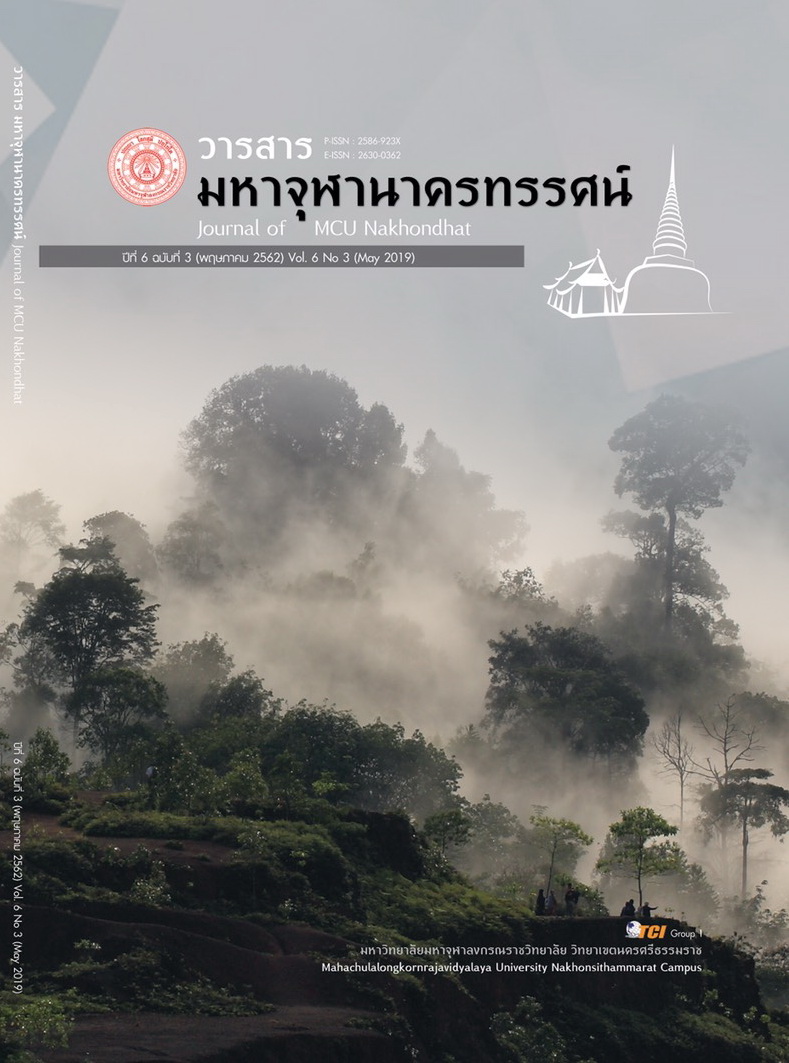THE APPLICATION OF THE BUDDHIST EPISTEMOLOGY OF KALAMASUTTA IN THE POSTMODERN THAI SOCIETY
Main Article Content
Abstract
The objectives of this research were as followings: 1) to study the paradigms of development of the postmodern Thai society 2) to study the Buddhist Philosophy on the principle of Kalamasutta 3) to apply the Buddhist philosophy on the principle of Kalamasutta for solving the problem of the postmodern Thai society 4) to create the new body of knowledge and form of development quality of life. The researcher used the documentary research and stressed the qualitative method, descriptive method and discursive method through the analysis.
The results of this research were found that firstly, even passed so long time, the thought, belief and behavior of the Thai society had yet accepted all paradigms. Secondly, Kalamasutta had appointed the post which the Buddha had introduced the Kalama people how to use the wisdom for hearing happened events then consider the contents whether it was valid or invalid. Kalama people must be ready to hear them through justice mind and without being not let until considered well after that they ought to believe. The humans deluded in materialism and consumerism and became slavery of matters because of the belief that humans’ happiness depended on the matter or based on the matter then denied the other, for example, religion. It was caused the life without equality and temperance. Hence humans sought only matter and money for support themselves. The new body of knowledge and the model of development of life quality could be summarized in 3 powers, that is to say, BKRS. They were derived from B = Belief, K = Knowledge and R = Reason, s = to Power of Postmodern Society.
Article Details
References
พุทธทาสภิกขุ. (2520) . ศีลธรรมกับมนุษยโลก. ไชยา: ธรรมทานมูลนิธิ.
พุทธทาสภิกขุ . (2549). ปัญหาแห่งมนุษยภาพ. ไชยา: ธรรมทานมูลนิธิ.
มหาจุฬาลงกรณราชวิทยาลัย. (2539). พระไตรปิฎก ฉบับมหาจุฬาลงกรณราชวิทยาลัย เล่มที่ 20. กรุงเทพฯ: มหาจุฬาลงกรณราชวิทยาลัย.
ยศ สันตสมบัติ. (2540). มนุษย์กับวัฒนธรรม. ครั้งที่ 2. กรุงเทพฯ: โรงพิมพ์มหาวิทยาลัยธรรมศาสตร์.
สมัคร บุราวาส. (2552). พุทธปรัชญา:มองพุทธศาสนาด้วยทรรศนะทางวิทยาศาสตร์. พิมพ์ครั้งที่ 4. กรุงเทพฯ: สำนักพิมพ์ศยาม.
สวัสดิ์ อโณทัย. (2558). วิธีการสร้างความสุขตามปรัชญาเศรษฐกิจพอเพียง. ใน วารสารวิชาการ วารสาเซนต์จอห์น. ปีที่ 18 ฉบับที่ 22 (มกราคม-มิถุนายน).
อนันตชัย จินดาวัฒน์. (2556). ประวัติศาสตร์โลก. พิมพ์ครั้งที่ 3. กรุงเทพฯ: ยิปซีกรุ๊ป.
อำนวย ยัสโยธา. (2547). กาลามสูตร. กรุงเทพฯ:โรงพิมพ์ ห.จ.ก. ภาพพิมพ์.
Eric Schmidt and Jared Cohen, เขียน. สุทธวิชญ์ แสงดาษดา, แปล. (2557). The New Digital Age. ดิจิตอลเปลี่ยนโลก. กรุงเทพฯ: โพสต์บุ๊ก.


